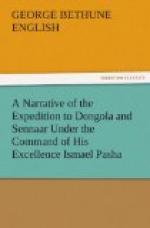[Footnote 73: This I suppose to be the point where terminates the singular bend in the river noticed in the former part of my journal.]
[Footnote 74: The wind, during the day, was constantly from the north, which was the general direction of our march from the time we quitted the river till we reached it again, so that we had the breezes always in our faces. The air of the desert is so very dry that no part of my body was moistened by perspiration except the top of my head, which was sheltered from the influence of the sun and air by the folds of my turban. I did not feel incommoded by heat in the desert when out of the sun’s rays, but on arriving at Assuan I found it almost intolerable.]
[Footnote 75: The names of the wells in the desert of Omgourann, between Berber and Seboo, are as follows:—1st, Apseach. 2d, Morat. 3d, El Medina. 4th, Amrashee, 5th, Mogareen. In the two latter, water is only found after heavy rains.]
[Footnote 76: Close by this rock was the skull of some wretched man who had perished on this spot. All along our route we saw hundreds of skeletons of camels. The skull that we saw probably belonged to one of two Mogrebin soldiers who deserted at Berber, in order to return to. Egypt, and who both perished with thirst in the desert.]
[Footnote 77: Our guide, an Abadie, would not permit the camels of our caravan to be watered at the well of Apseach, saying, that if he did, all the water then in the well would be consumed, and the consequence would be, that the nest traveler that came might perish with thirst.]
[Footnote 78: The ground near the well of Morat is full of scorpion holes. On my arrival at midnight I spread my carpet on the ground and slept soundly. In the morning when it was taken up, we found under it a scorpion, I am sure four inches in length, its color green and yellow. I was told that they abound near all the wells of the desert, and I have seen very many at different places on the borders of the river.]
[Footnote 79: Which we found to be the case till we came within fifteen hours march of the Nile.]
[Footnote 80: Out of the twenty-two camels that we had commenced our march with from Berber, only twelve reached the river.]
[Footnote 81: This was occasioned by the heat of the sun and the dryness of the air of the desert, which made nearly two fifths of our water to evaporate.]
[Footnote 82: Before we entered the desert our caravan had been joined by several runaway domestics, who had fled from the army to return to Egypt.]
[Footnote 83: The soldier of the Cadilaskier before mentioned, who was the conductor, i.e. the chief of the caravan, had recourse to a singular expedient to rouse one of them whom the whip could not stir. He seized his purse of money, which this man carried in his bosom, swearing that if he chose to stop and die there he might, and that he would be his heir and inherit his purse. This testamentary disposition on the part of the soldier had a wonderful effect. The man got up from the sand and walked forward very briskly, calling upon the soldier to restore the purse, as he was determined not to lie down any more till he reached the river. The soldier, however, observing the effect of his proceeding, retained the purse till we arrived at the river, when he restored it.]




